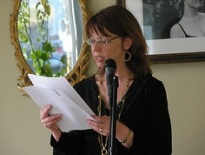by Autumn Stephens

Nine years ago, I was diagnosed with breast cancer. And suddenly, I had something in common with Dolly Parton and Jayne Mansfield: A lot of people were intensely—and exclusively—interested in my chest. In the course of a dizzying number of medical consultations, I learned to shrug out of my shirt or untie my gown at the drop of a hat. Pavlov’s dogs had nothing on me. At the tap of a doctor’s footsteps approaching the examining room, followed by a suspenseful silence as he or she paused outside to riffle through my chart, I’d get ready to strip. So a couple of months after my second surgery, when a new acupuncturist—a former Israeli soldier and medical researcher named Isaac Cohen—walked through the door, my fingers automatically flew to the top button of my shirt. “Whoa!” Isaac said, with a soft smile. “Let’s get to know each other first.”
Isn’t that what we all want, in sickness and in health—to be seen for who we really are, as more than our broken parts? Or, for that matter, more than our beauteous ones? (“Men are creatures with two legs and eight hands,” Jayne Mansfield—clearly a woman in the well put-together camp—is reputed to have said. Poor Jayne. See Jayne run.)
Living through a major illness leaves a hole in your sense of self. One day, you’re a multi-dimensional human being, someone with tastes and passions and opinions, someone who earns a living, makes love, makes dinner, calls their mother. The next, you’re a body in a bed. Period. It takes a long time—maybe forever—to fully recover from the shock of depersonalization.
And maybe, in the larger picture, we’re not meant to recover. Sometimes, ironically, it’s our wounds, the holes in the fragile fabric of our lives, which make us grateful for every moment that we don’t experience pain, or find ourselves bitterly recalling our former intact selves. Every moment where we’re seen as we see ourselves—not just as someone cancerous or curvaceous or convenient.
People often queried Isaac about his particular specialty—he only treated women with breast cancer. “I like women,” he’d say with a devilish grin. “And I like breasts. I don’t want anyone to lose one.” I had, in fact, already “lost one,” but during those wobbly post-mastectomy months, when I dreamed over and over about finding myself naked in a crowded swimming pool, Isaac’s charisma worked like, well, a charm. The most gifted healer I’d ever encountered, he brimmed with life energy and a deep, genuine curiosity that was as health enhancing as the needles he inserted or the herbs he prescribed. His focus on my entire being, from mundane to esoteric—what I liked to eat, how I felt about motherhood, my secret ambitions, my burgeoning interest in Buddhism—helped me reconstitute the true and coherent self that had been temporarily dismembered amid the chaos of cancer.
Rest assured, Isaac wouldn’t have kicked Jayne Mansfield out of his office, or failed to appreciate her voluptuous beauty. But he’d also have looked her in the eye, and asked directly, avidly, about her life, her ambitions, her fears. If she hesitated or stumbled, he wouldn’t have rushed her. “Keep your shirt on, lady,” he might have said, smiling in a way that made her smile, too. It would have seemed like there was just the right amount of space in the room. It would have seemed like there was all the time in the world.
Bio: Autumn Stephens edits poems and stories for Healing Journeys. A writer, editor, and facilitator of healing writing workshops, she lives in Berkeley, Calif., with her nuclear family. A previous version of "Reconstruction" was published in the November 2010 issue of The East Bay Monthly magazine.


